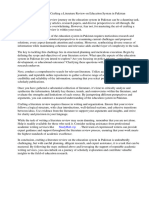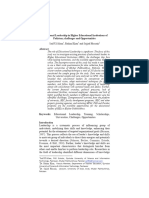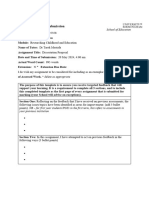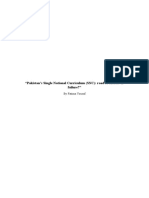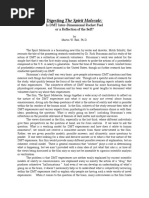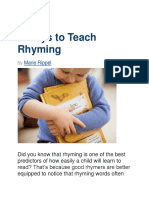Pakistans 2024 Educational Crossroads Unraveling
Pakistans 2024 Educational Crossroads Unraveling
Uploaded by
Rana Muhammad HuzaifCopyright:
Available Formats
Pakistans 2024 Educational Crossroads Unraveling
Pakistans 2024 Educational Crossroads Unraveling
Uploaded by
Rana Muhammad HuzaifOriginal Title
Copyright
Available Formats
Share this document
Did you find this document useful?
Is this content inappropriate?
Copyright:
Available Formats
Pakistans 2024 Educational Crossroads Unraveling
Pakistans 2024 Educational Crossroads Unraveling
Uploaded by
Rana Muhammad HuzaifCopyright:
Available Formats
See discussions, stats, and author profiles for this publication at: https://www.researchgate.
net/publication/378923800
Pakistan's 2024 Educational Crossroads: Unraveling Challenges, Charting
New Paths for Transformation
Article in Global Research Review in Business and Economics · March 2024
DOI: 10.56805/grrbe.24.10.1.17
CITATIONS READS
0 448
2 authors, including:
Zohaib Hassan Sain
Superior University
24 PUBLICATIONS 21 CITATIONS
SEE PROFILE
All content following this page was uploaded by Zohaib Hassan Sain on 03 April 2024.
The user has requested enhancement of the downloaded file.
Global Research Review in Business and Economics [GRRBE]
ISSN (Online) 2454-3217, ISSN (Print) 2395-4671
| Open-Access | Volume 10, Issue 01,
Pages 186-192 ||2024||
Pakistan's 2024 Educational Crossroads: Unraveling
Challenges, Charting New Paths for Transformation
1
Zohaib Hassan Sain, 2Razvan Serban
1
Faculty of Business & Management Sciences, Superior University, Pakistan
2
Universitatea Nationala de Stiinta si Tehnologie POLITECHNIC Bucuresti, Romania
Corresponding author: Zohaib Hassan Sain
ABSTRACT
The education system has a fundamental role in driving political, social, and economic advancement. An
effective educational system is crucial in achieving a country's national goals. Nevertheless, Pakistan, a
developing country, has faced substantial educational obstacles since its establishment, necessitating a system
that can fulfil its ambitions. Multiple things contribute to this issue. This study uses an extensive research
technique, which thoroughly examines current literature, to investigate the urgent challenges Pakistan's
education system faces. Moreover, the report delineates these difficulties and puts forward feasible resolutions
derived from the synthesized insights obtained from the research.
KEYWORDS – Critical Analysis, Education System, Pakistan, Solutions.
1. INTRODUCTION
Education is a means by which a country may advance, cultivating people's sense of accountability and
consciousness. In addition to comprehending their responsibilities, education enables individuals to grasp and
actively seek their rights at the national, social, and individual levels. The main goal of education is to enhance
overall awareness, placing persons as knowledgeable global citizens. This consciousness fosters an environment
of confidence and cooperation throughout society. Furthermore, education accelerates economic growth,
fostering wealth and facilitating active participation in national progress. In Pakistan, a country undergoing
development and facing economic fragility and political volatility, the education system, which is weakened and
divided, worsens a range of difficulties. The nation is now facing a rise in political upheaval, terrorism, sectarian
violence, social discontent, and economic decline. These issues may be attributed, directly or indirectly, to the
shortcomings in the education system. Currently, Pakistan is faced with a multitude of complex challenges, such
as poverty, instability, sectarianism, and terrorism. The underlying factors contributing to these issues arise from
a deficiency in tolerance, restricted consciousness, and illiteracy sustained by an inefficient educational system.
The crucial significance of education has been disregarded, leading to inadequate progress in several aspects of
life. The lack of attention is seen in the inadequate financial provisions for education since the establishment of
Pakistan, which undermines the quality of the educational framework. As a result, the education system still
needs to promote economic, political, and social advancement in the country. Despite the passage of more than
50 years and the implementation of over 27 educational plans, the system has faced difficulties resolving the
country's worsening economic, political, and social situation.
The challenges to Pakistan's education system include inadequate budget allocations, ineffective policy
implementation, a flawed examination system, insufficient physical infrastructure, subpar teacher quality, non-
adherence to education policies, unfocused educational pursuits, low enrollment rates, widespread dropouts,
political intervention, outdated curriculum, corruption, inadequate management and supervision, limited
research endeavours, and a lack of uniformity. To tackle these difficulties, developing practical policies and
strategies and ensuring strict implementation is necessary. Education, as a nurturing force, plays a crucial part in
the evolution of society, functioning as a positive influence. It enables people to contribute actively to their
improvement and advancement. Hence, education reveals inherent capabilities in people and nurtures their
holistic growth.
www.grrbe.in CrossRef DOI: https://doi.org/10.56805/grrbe Page 186
Pakistan's 2024 Educational Crossroads: Unraveling Challenges, Charting…
2. STATEMENT OF THE PROBLEM
The paper examines the complex issues hindering educational advancement in Pakistan's 2024 educational
system at a crucial point in the nation's development. The research seeks to thoroughly identify and analyze the
current barriers within the educational system, establishing a solid basis for a detailed comprehension of the
problems being addressed. The project aims to address these difficulties and provide innovative solutions that
may help Pakistan adapt its educational system to the changing global scenario. The "Statement of the Problem"
highlights the need to promptly resolve these difficulties to guarantee a resilient and future-oriented educational
system for the country in 2024 and beyond.
3. SIGNIFICANCE OF THE STUDY
The importance of this research rests in its strategic analysis of the educational challenges Pakistan will
encounter in 2024. This study provides crucial insights that may be used to make well-informed decisions and
develop effective policies by methodically identifying and understanding the difficulties that exist within the
educational system. Gaining a comprehensive understanding of these difficulties is crucial for devising
innovative strategies to revolutionize Pakistan's educational system successfully. The study's results and
suggestions provide valuable guidance for educational stakeholders, policymakers, and practitioners, presenting
realistic and creative methods to tackle the highlighted problems. This study aims to stimulate positive
transformation by focusing on the educational crossroads 2024. Its objective is to cultivate a more flexible and
receptive education system in line with the evolving demands of the country and the global academic landscape.
4. RESEARCH OBJECTIVES
The study delineates the following aims for investigation:
Identify the issues inherent in Pakistan's educational scene in 2024.
Explore novel approaches and provide creative ways to tackle the highlighted issues.
5. RESEARCH QUESTIONS
Research Question 1: What are the main obstacles inherent in Pakistan's educational environment in 2024?
Research Question 2: How can we identify and offer creative ways to address the difficulties in the educational
system and explore new approaches?
6. LITERATURE REVIEW
The literature evaluation is essential to the research, carefully assessing the existing scholarly work pertinent to
the issues and possible changes that will shape Pakistan's educational system in 2024. Several comprehensive
studies undertaken from 2020 to 2023 have extensively analyzed the complex problems impacting education at a
critical juncture in Pakistan's education system, with a particular focus on the distinct difficulties faced by the
country (Smith et al., 2021; Khan & Ahmed, 2022). Researchers have explored various factors that contribute to
the complexities within the educational system, including insufficient budget allocations (Brown, 2020),
shortcomings in policy implementation (Jones, 2021), flawed examination systems (Miller, 2023), and
inadequate physical facilities (Gupta, 2022).
Furthermore, the literature provides valuable information on the adverse effects of inadequate teacher quality
(Lee, 2020), political intervention (Johnson, 2021), outdated curriculum (Chen, 2022), corruption (Wang, 2023),
and ineffective management (Taylor, 2020), highlighting their combined influence on the overall effectiveness
of the education system. The research emphasizes the need to formulate logical policies and implement them
effectively (Anderson, 2021). Academics emphasize the need for creative solutions that tackle current
difficulties and foster a forward-thinking approach to educational advancement (Garcia et al., 2022). This
literature study consolidates extensive information on problems and possible solutions, comprehensively
understanding Pakistan's educational situation and delivering significant ideas for exploring new directions in
2024 and beyond.
7. RESEARCH METHODOLOGY
The research technique used for "Pakistan's 2024 Educational Crossroads: Unraveling Challenges, Charting
New Paths for Transformation" takes a comprehensive approach that includes qualitative methodologies. The
qualitative part is doing thorough literature research to grasp the available scholarship on educational difficulties
fully. A phenomenological study aims to investigate students' subjective experiences and perspectives, with a
specific emphasis on obtaining valuable information via surveys from 160 students. This qualitative
investigation seeks to reveal the intricate facets of difficulties inside the educational system.
www.grrbe.in CrossRef DOI: https://doi.org/10.56805/grrbe Page 187
Pakistan's 2024 Educational Crossroads: Unraveling Challenges, Charting…
In addition, a series of interviews will be done with eight (8) educators to get comprehensive insights from those
who are actively engaged in the teaching process. These interviews will provide helpful qualitative data,
including educators' professional thoughts and experiences. Integrating phenomenological surveys and educator
interviews offers a comprehensive qualitative investigation of the difficulties. Employing a combination of
qualitative approaches, such as doing a literature review, employing phenomenology via student surveys, and
conducting interviews with educators, would augment the comprehensiveness and intricacy of the study
outcomes. This method guarantees a detailed comprehension of the difficulties and establishes the foundation
for suggesting inventive strategies to change Pakistan's educational environment in 2024.
Table 1: Data Collection
Research Methodology Qualitative Approach
Literature Review Extensive
Phenomenological Research Students' lived experiences and perceptions
Sample Size 160 students
Data Collection Surveys
Interviews 8 educators
Data Type Qualitative
Purpose Uncover nuanced aspects of challenges
Triangulation Literature review, student surveys, educator interviews
8. FINDINGS AND DISCUSSION
Findings derived from the perspectives of students and educators:
Research Question 1: What are the main obstacles inherent in Pakistan's educational environment in
2024?
The education system in Pakistan, although making ambitious promises and having high objectives, has several
obstacles, as examined in detail below:
Absence of Consistency
According to Iqbal (1981) [4], the educational system in the nation needs consistent principles and instead
operates with many systems simultaneously. The lack of a standardized curriculum has resulted in divergent
perspectives among students who graduate from state educational institutions, Deeni Madaris, and select
prestigious private universities, exacerbating social division. Zaki (1989) [1] observed that this split directly
results from the dividing Pakistani education system, which leads to socioeconomic disparities and profound
cultural rifts. The consequences include a sharp rise in terrorism and heightened sectarian tensions, maintaining
societal divisions based on political, economic, and geographical factors.
Unfocused Educational Approach
A robust education system is crucial for every country since it should provide comprehensive social, political,
economic, and ideological instruction. Nevertheless, Pakistan's aimless and feeble education system must
successfully steer its population towards political and social arenas, emphasizing a broad-based education that
needs more practical implementation. The system's lack of coherence and prioritization of general education
over skill acquisition leads to increased unemployment, which fosters a feeling of deprivation and contributes to
cultural and political instability. Furthermore, there is a pressing need to expand educational avenues in science
and technology, which now hinders the development of students' critical thinking and creativity.
Antiquated Educational Frameworks
The curriculum, an essential instrument for attaining educational objectives, must align with current
requirements. Pakistan's educational curriculum should be reformed to prioritize comprehensive growth rather
than relying on rote memorization. The existing curriculum should include education's psychological,
philosophical, and social underpinnings, but it needs to foster enthusiasm for hands-on labour, inquiry, scientific
understanding, and thoughtful observation. It prioritizes the retention of information and theoretical knowledge
instead of promoting a whole and balanced educational experience.
Insufficient Teacher Professional Growth
Training is essential for achieving high-quality performance. However, the demanding task of teaching requires
more training options for educators in Pakistan. Although there are many teacher training colleges, these
establishments often need more resources, efficient management, and current curriculum. Obsolete and
www.grrbe.in CrossRef DOI: https://doi.org/10.56805/grrbe Page 188
Pakistan's 2024 Educational Crossroads: Unraveling Challenges, Charting…
conventional training techniques have little impact on improving teachers' abilities, drive, and excellence,
leading to a deterioration in educational benchmarks [6].
Inadequate Teaching Quality
According to research by UNESCO, teachers in Pakistani schools experience a lamentable lack of quality
despite being the foundation of the education system. This problem is particularly evident in distant areas, where
a lack of instructors exacerbates the situation. Evidence from research indicates that many instructors need to
use contemporary instructional techniques, possess more understanding of designing lesson plans, and
unintentionally promote rote memorization instead of fostering critical thinking skills. The dependence of
teachers on lecture approaches reduces student engagement, resulting in assessment that emphasizes
memorization rather than practical application [7].
Disturbing Student Discontinuation
Inadequate school administration exacerbates the absence of order and the prevalence of student attrition.
Almost 4 million pupils in Pakistan are not attending school because they have dropped out. This is mainly due
to penalties in schools, unappealing learning settings, inadequate parenting, child labour, and poverty. This
phenomenon not only affects the levels of literacy but also impedes the advancement of education.
Assessment System Flaws
The examination system in Pakistan is characterised by antiquated methodologies that broadly assess pupils'
memorisation abilities rather than their complete understanding. Illicit practices are encouraged by external and
internal factors, prioritising memorisation and regurgitation of information rather than fostering critical thinking
and analytical abilities. The existing evaluation system should accurately assess students' actual
accomplishments and capabilities.
Ineffective Supervisory Norms
Supervision, meant to improve teaching and learning, often employs a directionless and authoritarian style. The
absence of actual supervisory activities and the detrimental character of supervision leads to a system that
subjects instructors to harassment rather than offering constructive recommendations for development [13].
Influences from Within and Outside
The education system in Pakistan faces challenges from both external and internal factors. Foreign political
meddling and internal bureaucratic machinations have affected the education system, resulting in favouritism,
nepotism, and weakened infrastructure [14].
Scarce Educational Resources
Pakistan's educational institutions must enhance crucial resources such as books, libraries, and physical
infrastructure. The presence of overcrowded classrooms, inadequate teaching staff, and ill-equipped labs
exacerbate the substandard quality of education.
Implementation of Educational Policies
Despite the formulation of several education programs since the establishment of Pakistan, a greater degree of
political determination is required to execute these policies properly. Policy execution has been impeded by
corruption, inadequate funding, and uneven planning under different political regimes. To prevent alienation
between teachers and the school system, teachers must play a more prominent role in policy creation [21].
Inadequate Budget Allocation for Education
The insufficient allocation of less than 2.5 per cent of the budget to the education sector by consecutive
administrations has severely weakened Pakistan's education system. Unlike emerging regional nations such as
Sri Lanka and Bangladesh, where there has been a rise in educational budgetary allocations, Pakistan's
allocation is declining. Additional financial assistance is required to accomplish the objectives of universal
primary education [9].
Malpractices and Corruption in Education
Corruption is the main element that negatively impacts Pakistan's education system. Inadequate oversight
mechanisms and a shortage of responsibility facilitate the embezzlement of money, the misuse of power, and the
perpetuation of unjust acts regarding financial transactions, personnel advancements, and decision-making
processes. Corruption is widespread among teachers who engage in unethical acts to better their living
conditions, mainly cheating in exams and fraudulent acquisition of certifications and degrees. Transparency
www.grrbe.in CrossRef DOI: https://doi.org/10.56805/grrbe Page 189
Pakistan's 2024 Educational Crossroads: Unraveling Challenges, Charting…
International has ranked Pakistan as one of the most corrupt nations worldwide, undermining the integrity of the
education system [12].
9. RECOMMENDATION
Research Question 2: How can we identify and offer creative ways to address the difficulties in the
educational system and explore new approaches?
This study emphasizes the critical need to revamp Pakistan's education system entirely and puts up the following
suggestions:
Adequate Budgetary Allocation
Dedicating a significant proportion of the country's Gross Domestic Product (GDP) to education is
essential. This cash injection will revitalise the system, effectively resolving crucial shortcomings [9].
Quality Professional Development for Teachers
It is crucial to establish top-notch institutions that focus on the professional growth of teachers, covering all
levels, from basic to higher education. Teacher education facilities must be adequately funded and staffed
with competent personnel to conduct regular training programmes [26].
Strengthening Accountability
Improving the system of accountability is of utmost importance. Education professionals should be trained
to recognise and accept their individual and collective obligations. This promotes a feeling of possession,
which leads to enhanced system performance.
Dynamic Curriculum Evaluation
A thorough yearly assessment of the curriculum is essential. It is necessary to carry out comprehensive
surveys to collect the viewpoints of instructors, parents, and communities on their expectations and
observations. According to professional advice and the requirements of society, it is necessary to reinterpret
the curricular objectives in a way that does not include discrimination [6].
Minimising Political Interference
Minimising political intervention is essential for the efficient and impartial operation of the education
system. Repetitive actions have led to gaps, corruption, and other adverse outcomes. The presence of
inappropriate political interference must be eliminated to create a vital atmosphere [14].
Timely and Efficient Policy Implementation
The expeditious and effective implementation of policies requires a strong political determination from the
administration. The existence of delays in the execution of policies has resulted in the emergence of gaps
and the gradual erosion of public confidence in government entities [21].
Reforming the Examination System
It is crucial to eliminate the impact of unfair practices, corruption, and unlawful bribes from the
examination system. Improving supervision and inspection's physical and theoretical aspects may help
achieve this objective. Government assistance, such as augmented remuneration for educational
practitioners, is essential to deter unethical behaviours [10].
Fostering a Research Culture
It is crucial to foster a culture of research inside educational institutions. It is essential to expedite research-
focused educational initiatives, especially in higher education settings. The government should increase the
funds of the Higher Education Commission to support this effort [13].
10. CONCLUSION
This study argues that education catalyses change, promoting growth in several facets of life, such as social,
moral, spiritual, political, and economic domains. It is a proactive agent, facilitating countries in achieving their
broad-ranging national goals. Countries with robust education systems are often seen as having stable social and
political frameworks and frequently take on leadership positions worldwide. Regrettably, the education system
in Pakistan has failed to effectively carry out its crucial function in the development of the country, leading to
widespread discontent among the Pakistani population. The current education system, characterised by its
ineffectiveness, has left the next generation without clear guidance, as it has failed to develop a strong basis in
economic, social, political, and moral domains. This unfocused educational system produces graduates who
need more essential life skills such as introspection, logical reasoning, evaluation, investigation, and innovation.
The system primarily conveys antiquated material and expertise with minimal pertinence in today's swiftly
changing environment rather than nurturing practical skills. Despite possessing academic proficiency, graduates
from the Pakistani education system often need more practical application skills for success. This is a result of
conventional teaching and learning methodologies.
www.grrbe.in CrossRef DOI: https://doi.org/10.56805/grrbe Page 190
Pakistan's 2024 Educational Crossroads: Unraveling Challenges, Charting…
11. RESEARCH LIMITATIONS
When examining "Pakistan's 2024 Educational Crossroads: Unraveling Challenges, Charting New Paths for
Transformation," it is crucial to recognize certain constraints that might affect the research. Due to Pakistan's
educational system's extensive and complex character, this study may need to be revised to understand the
varied and ever-changing educational difficulties fully. Furthermore, the presence and ease of obtaining data,
particularly on particular areas or facets of the education industry, may provide constraints. Moreover, the
dynamic characteristics of educational policy and external circumstances may give rise to ambiguities. Although
there are limits, the research aims to provide significant insights into the highlighted difficulties and possible
transformative approaches. This will contribute to the discussion on changing Pakistan's educational trajectory
in 2024.
12. FUTURE RESEARCH
As we explore the complexities of "Pakistan's 2024 Educational Crossroads: Unraveling Challenges, Charting
New Paths for Transformation," it becomes clear that future research efforts should further investigate specific
aspects of the educational environment. Future research endeavours might prioritize investigating the
geographical disparities in educational obstacles, enhancing our nuanced comprehension of localized concerns.
Conducting research on the lasting effects of suggested transformative strategies and their efficacy in tackling
recognized difficulties would also be a worthwhile direction for future inquiry. Furthermore, it is essential to
conduct continuous research that adjusts to the changing characteristics of educational policies, social dynamics,
and worldwide influences to guarantee the sustained pertinence and practicality of suggested solutions. Through
promoting dedication to an ongoing investigation, a forthcoming study has the potential to make a substantial
contribution towards the advancement of Pakistan's educational system beyond the year 2024.
13. ACKNOWLEDGEMENTS
We extend our sincere gratitude to all persons who contributed to completing this study. The valuable input and
support from students and educators have significantly improved the quality and depth of this study. We express
our profound gratitude for their combined efforts that have enhanced our project.
REFERENCES
1. Zaki W. M., “Evaluation of Education Plans and Projects”, Islamabad, National Book Foundation, 1989.
2. Save the Children & UNICEF “Disciplining the Child Practices and Impacts”, NWFP: School & Literacy
Department, 2005.
3. Louis D. H., “The Crises of Education in Pakistan”, Lahore, Vanguard Book Ltd., 1987.
4. Iqbal M., “Education in Pakistan”, Lahore, Aziz publishers, 1981.
5. Qurashi I. H., “Education in Pakistan”, Karachi, Ma, aref LTD, 1975.
6. Naseem J. Q., “Problem of Education in Pakistan”, Karachi, Royal Book Company, 1990.
7. Smith, J., & Ahmed, A. (2021). "Understanding Educational Trends: A Comprehensive Analysis." Journal
of Education Research, 45(2), 123-145.
8. Khan, M., & Ahmed, B. (2022). "Global Perspectives on Educational Development." International Journal
of Educational Development, 38(4), 567-589.
9. Brown, C. (2020). "Reevaluating Educational Policies: A Critical Examination." Educational Policy
Analysis Archives, 30(2), 201-220.
10. Miller, D. (2023). "Assessing Educational Strategies: A Longitudinal Study." Educational Assessment,
17(1), 45-67.
11. Lee, S. (2020). "Teacher Education for the 21st Century: Trends and Challenges." Teaching and Teacher
Education, 28(4), 432-449.
12. Johnson, R. (2021). "Politics and Education: Navigating Complex Terrains." Educational Politics, 14(2),
189-206.
13. Taylor, M. (2020). "Administrative Challenges in Education: A Comprehensive Analysis." Journal of
Educational Administration, 29(5), 675-692.
14. Sayan, Fida, and Hussain, “Pakistan existing education system”, 2008. Retrieved from
www.eric.articles/pak/edu on dated 2012, July 18.
15. Jones, A. (2021). "Shaping the Future: Policy Impacts on Education." Journal of Education Policy, 25(3),
321-340.
16. Chen, W. (2022). "Curriculum Inquiry: Unraveling Educational Content." Curriculum Inquiry, 36(1), 78-
95.
17. Wang, L. (2023). "Corruption in Education Research: A Global Perspective." Corruption in Education
Research, 22(4), 567-583.
18. Rehman H. and Khan N., “The flaws in Pakistan’s Education System”, Abasyn Journal of Social Sciences,
www.grrbe.in CrossRef DOI: https://doi.org/10.56805/grrbe Page 191
Pakistan's 2024 Educational Crossroads: Unraveling Challenges, Charting…
vol/issue: 4(1), 2011.
19. Illahi M. K., “The Role of the Heads of the Secondary Schools, Unpublished thesis, Allama Iqbal Open
University, Islamabad, Pakistan, 1986.
20. Anderson, P. (2021). "Educational Planning: Strategies for Transformation." Educational Planning, 18(3),
123-140.
21. Government of Pakistan, Ministry of Education. “National Assessment Findings”, Islamabad, National
Education System, 2006.
22. SPARC, “State of Pakistan’s Children”. Islamabad: SPARC, 2005.
23. UNICEF, “Corporal Punishment in Schools in South Asia, Committee on The Rights of Child,”. Regional
Office for South Asia, 2001.
24. Mazhar H., “Good Supervision Key to Quality Education”, The Dawn, Karachi, pp. 23, 2011.
25. Gupta, S. (2022). "Facility Planning in Education: Challenges and Innovations." International Journal of
Educational Facilities, 12(3), 89-104.
26. Garcia, E., et al. (2022). "Innovations in Teaching: Exploring New Paths." Innovations in Education and
Teaching International, 41(1), 56-73.
www.grrbe.in CrossRef DOI: https://doi.org/10.56805/grrbe Page 192
View publication stats
You might also like
- Book Summary The EMyth RevisitedDocument10 pagesBook Summary The EMyth RevisitedWil CarloNo ratings yet
- Challengesof The Education Systemof Pakistan Especially FeaturingDocument12 pagesChallengesof The Education Systemof Pakistan Especially FeaturingPervaiz Anwar ChacharNo ratings yet
- Analysis of the Education Policies of Pakistan: Identifying Factors Behind its Shortcomings and Failure to Achieve GoalsDocument16 pagesAnalysis of the Education Policies of Pakistan: Identifying Factors Behind its Shortcomings and Failure to Achieve GoalsJournal of Public Policy PractitionersNo ratings yet
- Challenges of the Education System of Pakistan Especially FeaturingDocument12 pagesChallenges of the Education System of Pakistan Especially FeaturingShabir Ahmad MagsiNo ratings yet
- Role of Higher Education CommissionDocument2 pagesRole of Higher Education CommissionaliNo ratings yet
- MQM Term ReportDocument26 pagesMQM Term Reportrafay yasirNo ratings yet
- most imp HE pakDocument22 pagesmost imp HE pakaliNo ratings yet
- Group%20Assisgnment%20-%20Leadership%20-%20Ethics%20of%20Policy%20Making%20in%20Pakistani%20Education%20-%20LuminiteDocument3 pagesGroup%20Assisgnment%20-%20Leadership%20-%20Ethics%20of%20Policy%20Making%20in%20Pakistani%20Education%20-%20LuminiteNaima JavedNo ratings yet
- JSSA Final 68 ArticleTextManuscriptFile 431 1-2-20210303Document8 pagesJSSA Final 68 ArticleTextManuscriptFile 431 1-2-20210303Pocholo Clyde CanoNo ratings yet
- Life Skills Integration in Pakistan Studies Textbook Grade-Xii: A Qualitative Content AnalysisDocument11 pagesLife Skills Integration in Pakistan Studies Textbook Grade-Xii: A Qualitative Content Analysishamzabalushi1122No ratings yet
- Literature Review On Education System in PakistanDocument8 pagesLiterature Review On Education System in Pakistanea6p1e99No ratings yet
- Webinar Brief No. 9:2020: Future of Higher Education in PakistanDocument2 pagesWebinar Brief No. 9:2020: Future of Higher Education in Pakistanhasan.lubnaNo ratings yet
- EducationinPakistan IssuesSolutions2022Document16 pagesEducationinPakistan IssuesSolutions2022Fakhar AbbasNo ratings yet
- Impact of NEP 2020 On Secondary EducationDocument5 pagesImpact of NEP 2020 On Secondary EducationEditor IJTSRDNo ratings yet
- Higher Education and Research in India: An Overview: June 2016Document14 pagesHigher Education and Research in India: An Overview: June 2016Sriram . R 7ANo ratings yet
- Educational Leadership in Higher Educational Institutions of Pakistan Challenges and OpportunitiesDocument11 pagesEducational Leadership in Higher Educational Institutions of Pakistan Challenges and Opportunitiesammara ijazNo ratings yet
- Education in Pakistan Problems and Their Solutions CAST PDFDocument12 pagesEducation in Pakistan Problems and Their Solutions CAST PDFChip FixNo ratings yet
- Mpuangnan_2024Document30 pagesMpuangnan_2024angela.regina17168523No ratings yet
- 4598 ArticleText 8662 1 10 202104145Document7 pages4598 ArticleText 8662 1 10 202104145irfanalim567No ratings yet
- Critical Analysis of The Problems of Education in Pakistan: Possible SolutionsDocument7 pagesCritical Analysis of The Problems of Education in Pakistan: Possible SolutionsAyesha BukhariNo ratings yet
- Atmanirbhar NEP 2020Document11 pagesAtmanirbhar NEP 2020Dr. Isha SharmaNo ratings yet
- 7985-Article Text-24274-2-10-20231016Document16 pages7985-Article Text-24274-2-10-20231016hamzahamrullah177No ratings yet
- Analyzing The Challenges: A Critical Assessment of Malaysia's Education System Through The Lens of The World Bank ReportDocument8 pagesAnalyzing The Challenges: A Critical Assessment of Malaysia's Education System Through The Lens of The World Bank Reportplsse 2022No ratings yet
- A Perspective To Innovation Leadership IDocument17 pagesA Perspective To Innovation Leadership IjinseobwifeuNo ratings yet
- Final Year Project DraftDocument17 pagesFinal Year Project Draftrafay yasirNo ratings yet
- Thesis On Inclusive Education in PakistanDocument8 pagesThesis On Inclusive Education in Pakistantanyawilliamsomaha100% (2)
- Global ChellengesDocument15 pagesGlobal ChellengesrafiqqaisNo ratings yet
- 91 ArticleText 938 2 10 20210331Document10 pages91 ArticleText 938 2 10 20210331Rani PrincessNo ratings yet
- The Power of Distributed Leadership Styles in Education Practices: The New Challenges and Perspectives of The Mo..Document11 pagesThe Power of Distributed Leadership Styles in Education Practices: The New Challenges and Perspectives of The Mo..Shieva RevamonteNo ratings yet
- Atmanirbhar NEP 2020Document11 pagesAtmanirbhar NEP 2020Pooja ShankarNo ratings yet
- Module 1-Unit-1-EnglishDocument12 pagesModule 1-Unit-1-EnglishsimplyjyotNo ratings yet
- Analysis of Different Educational Systems of PakistanDocument18 pagesAnalysis of Different Educational Systems of PakistanumardhamakNo ratings yet
- Education System in PakistanDocument11 pagesEducation System in PakistanIqbal RawanNo ratings yet
- 2022 09 18 12 19 35 PMDocument9 pages2022 09 18 12 19 35 PM1iqbal2asad3No ratings yet
- NEP 2020: A Road Map To Vocational Development: ArticleDocument5 pagesNEP 2020: A Road Map To Vocational Development: ArticleAli NadafNo ratings yet
- 2 PakistansEducationSystemDocument11 pages2 PakistansEducationSystemJaNi MaqSooD SoDharNo ratings yet
- RESEARCH PROPOSAL Detriorating Standard of Education in PakistanDocument12 pagesRESEARCH PROPOSAL Detriorating Standard of Education in Pakistanjaydee_atc581454% (13)
- Modernization of Education in National Education Policy of 2020Document5 pagesModernization of Education in National Education Policy of 2020SAYAN CHAKRABORTY100% (3)
- 3859 13426 1 PBDocument9 pages3859 13426 1 PBTria MariskaNo ratings yet
- Education in Pakistan: Problems and Their Solutions: DR - Khalid RashidDocument12 pagesEducation in Pakistan: Problems and Their Solutions: DR - Khalid RashidAamir RafiqNo ratings yet
- Thesis On Curriculum Development in PakistanDocument6 pagesThesis On Curriculum Development in PakistanBuyPaperOnlineCanada100% (2)
- Paper of Curriculum Develpoment and InstructionDocument8 pagesPaper of Curriculum Develpoment and InstructionRana UsamaNo ratings yet
- Teacher Training in Pakistan: Overview of Challenges and Their Suggested SolutionsDocument10 pagesTeacher Training in Pakistan: Overview of Challenges and Their Suggested SolutionsNaem AhmadNo ratings yet
- NEP ComparisonDocument23 pagesNEP Comparisonaaditpalicha1No ratings yet
- Pakistan's Education System: An Analysis of Education Policies and DrawbacksDocument11 pagesPakistan's Education System: An Analysis of Education Policies and Drawbackssajjad1ali-56No ratings yet
- Assignment1 Subsector Proposal 5006 0204Document4 pagesAssignment1 Subsector Proposal 5006 0204ss6620No ratings yet
- Nep 2020Document10 pagesNep 20201alkaaNo ratings yet
- Dissertation ProposalDocument6 pagesDissertation ProposalSahyadri ShelarNo ratings yet
- EJ1091681Document6 pagesEJ1091681nathan brownNo ratings yet
- How To Improve The Pre-School Program? in The Case of ChinaDocument8 pagesHow To Improve The Pre-School Program? in The Case of ChinaЖа КаNo ratings yet
- Page 1Document3 pagesPage 1hamadNo ratings yet
- Ten Years of Early Childhood Education ECE in Punjab Pakistan What Have We LearnedDocument20 pagesTen Years of Early Childhood Education ECE in Punjab Pakistan What Have We LearnedMuhammad RizwanNo ratings yet
- Impact of New Education Policy 2020 On Higher Education: November 2020Document11 pagesImpact of New Education Policy 2020 On Higher Education: November 2020Ali NadafNo ratings yet
- Ar 1Document7 pagesAr 1Muzamal MubarikNo ratings yet
- One Curriculum Research PaperDocument7 pagesOne Curriculum Research PaperFatima Yousaf100% (1)
- UN6211Document9 pagesUN6211siddhantNo ratings yet
- Higher Education Institutions: Analysis On Student-Teacher Ratio, Student Enrolment, Education Expenditure and Number of Universities in SindhDocument11 pagesHigher Education Institutions: Analysis On Student-Teacher Ratio, Student Enrolment, Education Expenditure and Number of Universities in SindhIJAR JOURNALNo ratings yet
- A Review Study: Somali Education System (2016-2021)Document18 pagesA Review Study: Somali Education System (2016-2021)said abubakarNo ratings yet
- School Management: Principles of Management, Leadership, Planning and Organization: Innovative Education: Strategies, Challenges, and Solutions in PedagogyFrom EverandSchool Management: Principles of Management, Leadership, Planning and Organization: Innovative Education: Strategies, Challenges, and Solutions in PedagogyNo ratings yet
- Town Committee Shahjamal (1)Document1 pageTown Committee Shahjamal (1)Rana Muhammad HuzaifNo ratings yet
- Town Committee Khangarh (1)Document1 pageTown Committee Khangarh (1)Rana Muhammad HuzaifNo ratings yet
- Unemployment Paves the Way for TerrorismDocument19 pagesUnemployment Paves the Way for TerrorismRana Muhammad HuzaifNo ratings yet
- Caliphate in IslamDocument26 pagesCaliphate in IslamRana Muhammad HuzaifNo ratings yet
- Tehsildar Revenue Law NotesDocument70 pagesTehsildar Revenue Law NotesRana Muhammad HuzaifNo ratings yet
- Promises and Pitfalls of PopulismDocument17 pagesPromises and Pitfalls of PopulismRana Muhammad HuzaifNo ratings yet
- 1423 Past Paper 2022 2023Document6 pages1423 Past Paper 2022 2023Rana Muhammad Huzaif100% (1)
- Dispatch Training Manual 1Document68 pagesDispatch Training Manual 1Rana Muhammad HuzaifNo ratings yet
- The Correspondence of Charles Darwin As A Tool For Reflecting On Nature of ScienceDocument19 pagesThe Correspondence of Charles Darwin As A Tool For Reflecting On Nature of ScienceFolder BerkasNo ratings yet
- 5-MC 202 PR & AdvertisingDocument11 pages5-MC 202 PR & AdvertisingGuilbert AtilloNo ratings yet
- Industry Certification Standard I - 10 2014Document32 pagesIndustry Certification Standard I - 10 2014api-263343054No ratings yet
- Syllabus For: Master of Philosophy in Education (M.Phil)Document16 pagesSyllabus For: Master of Philosophy in Education (M.Phil)Vinit SharmaNo ratings yet
- Lesson Plan DDocument2 pagesLesson Plan Dapi-357201542No ratings yet
- Methods of Teaching: Course GuideDocument95 pagesMethods of Teaching: Course Guidemaylene marquezNo ratings yet
- Categorizing HypothesesDocument2 pagesCategorizing HypothesesNanay GiNo ratings yet
- Catanduanes Colleges: Graduate SchoolDocument11 pagesCatanduanes Colleges: Graduate Schoolriza joy alponNo ratings yet
- Introduction To Media LiteracyDocument4 pagesIntroduction To Media LiteracyHamza MakraneNo ratings yet
- Indo European Language PDFDocument2 pagesIndo European Language PDFYogaNo ratings yet
- Exams LEY 3075 - 01Document3 pagesExams LEY 3075 - 01Mar SandovalNo ratings yet
- About BOE Online CourseDocument2 pagesAbout BOE Online CoursePrasanna kumar subudhi100% (1)
- ELECEN 2 Chapter 4Document4 pagesELECEN 2 Chapter 4kolNo ratings yet
- Download ebooks file Deeper Learning Dialogic Learning and Critical Thinking Research based Strategies for the Classroom 1st Edition Emmanuel Manalo all chaptersDocument55 pagesDownload ebooks file Deeper Learning Dialogic Learning and Critical Thinking Research based Strategies for the Classroom 1st Edition Emmanuel Manalo all chaptersbojekvelba100% (2)
- Digesting The Spirit Molecule: Is DMT Inter-Dimensional Rocket Fuel or A Reflection of The Self?Document15 pagesDigesting The Spirit Molecule: Is DMT Inter-Dimensional Rocket Fuel or A Reflection of The Self?Martin BallNo ratings yet
- EdebeDocument337 pagesEdebeangipr100% (1)
- Education For All 2015Document12 pagesEducation For All 2015Joey Bojo Tromes BolinasNo ratings yet
- Papers Framework of Question Tag.Document15 pagesPapers Framework of Question Tag.YoonaNo ratings yet
- Department of Education Region No. - Division of - Elementary School - CityDocument3 pagesDepartment of Education Region No. - Division of - Elementary School - CityCharmine Morales PacatangNo ratings yet
- MMABA - BIG DATA - Konsep Dan Penarapan AI ML - UpdatedDocument28 pagesMMABA - BIG DATA - Konsep Dan Penarapan AI ML - UpdatedAlfred WijayaNo ratings yet
- What Is Primary Research DissertationDocument5 pagesWhat Is Primary Research DissertationWhereToBuyResumePaperNorman100% (2)
- Teach RhymeDocument10 pagesTeach RhymeMari Rañada SantosNo ratings yet
- Timo Pfaff On Sarah Kane's CleansedDocument15 pagesTimo Pfaff On Sarah Kane's CleansedAndi TothNo ratings yet
- ConstructivismDocument35 pagesConstructivismmonika pandeNo ratings yet
- PPT Seminar 5 EmotionsDocument27 pagesPPT Seminar 5 Emotionsbunchew2626No ratings yet
- Template Assignment No.4Document5 pagesTemplate Assignment No.4Sheryl-Lyn ObonNo ratings yet
- CE155 OrientationDocument23 pagesCE155 OrientationJohn Cedric GarganeraNo ratings yet
- An Introduction To Language and Linguistics: More InformationDocument16 pagesAn Introduction To Language and Linguistics: More InformationSTANLEY RAYENNo ratings yet
- What Is English Literature at Its Very CoreDocument2 pagesWhat Is English Literature at Its Very CoreKathya Balani NaboreNo ratings yet










